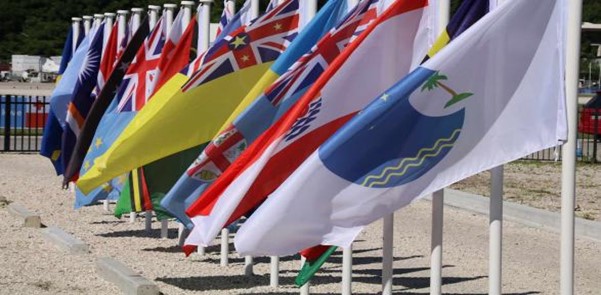The Pacific as an Ocean of Peace
Academic Action Diplomacy: Where research meets policy and generates impact
Professor Sue Farran’s research has focused on the Pacific, working closely with diverse stakeholders in the Pacific. From January 2021 to December 2024, she was appointed as a Research Fellow for the Foreign, Commonwealth and Development Office (FCDO) in London, funded by UKRI and the FCDO. In that role, Sue worked alongside many British Diplomats including the British High Commissioner to Fiji, Dr Brian Jones.
The Fijian Ministry of Foreign Affairs (MOFA) requested Dr Brian Jones to engage a team of academics to advance understandings of the Ocean of Peace (OoP) concept. Dr Jones reached out to Sue to create the team of UK academics to be involved in this project.
The team consists of
- Professor Mark Owen (Winchester),
- His Excellency Dr Brian Jones, British High Commissioner to Fiji,
- Professor Sue Farran (Newcastle),
- Alejandro Posada-Tellez (Ph.D student Oxford),
- William W. McInerney (LSE)
- Dr Colins Imoh (Bradford University)
Photo: Fiji-UK Policy Research Project Team Members (left to right): Professor Mark Owen, His Excellency Dr Brian Jones, Professor Sue Farran, Alejandro Posada-Tellez, William W. McInerney and Dr Colins Imoh. Taken in the British High Commissioner's Official Residence, Gordon House, Suva.
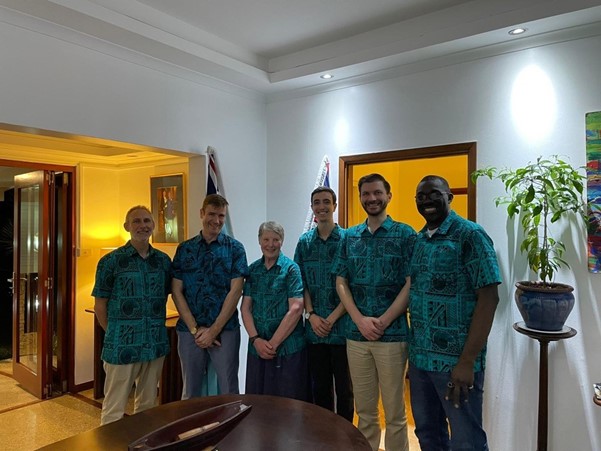
The origin of the Pacific as an Ocean of Peace
In 1970 addressing the United Nations Ratu Sir Kamisese Mara, former Prime Minister of Fiji, articulated his vision of the Pacific region as a “Ocean of Peace”, emphasising the region’s unique ‘Pacific Way’ approach to peacebuilding, which prioritizes peaceful resolution of conflicts through shared values, local customs, and dialogue.
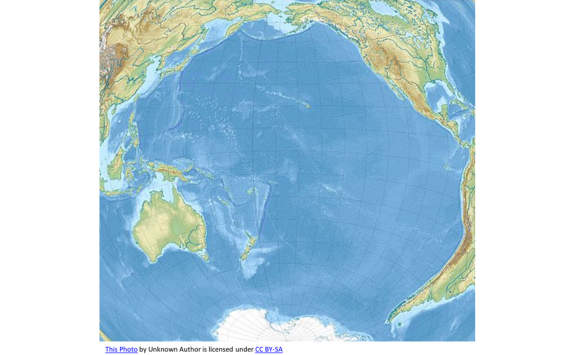
In 2023, Fijian Prime Minister Sitiveni Rabuka introduced the concept of an ‘Ocean of Peace’ at the UN General Assembly. Since then, the idea has gained traction as both a response to external geopolitical developments and a proactive way to frame regional security through Pacific values. For PM Rabuka, the OoP champions the region’s own vision for the future by drawing on the strengths of the ‘Pacific Way’, so that a culture of dialogue, consensus-building, and mutual respect can guide collective action.
Research Activity
In April 2024, the team travelled to Suva, Fiji to engage with Pacific stakeholders. They met with over 100 stakeholders, including faith leaders, youth groups, women’s organisations, chiefs, civil servants, civil society actors, members of the security sector, scholars, artists, media workers and representatives of international and regional bodes.
The dialogues were created by traditional and arts-based approaches, guided by a simple, open question: “An Ocean of Peace is...?”. Funding was provided by the FCDO London and Suva.
In 2025, Sue secured further funding from Newcastle University’s ESRC Impact Acceleration Account to follow up on developments regarding the Ocean of Peace.
Working with a small team in collaboration with the Pacific Centre for Peacebuilding, a Fiji-based civil society organisation, the project is ongoing but has already created outputs including an open access briefing paper.
An initial visit to Fiji, by Sue, took place in May 2025 to lay the foundation of this project. She met with representatives from the Pacific Centre for Peacebuilding, the University of the South Pacific, Pacific Women Mediators’ Network, the Fiji Council of Churches, Dr Lesi (Private Secretary in the Prime Minister’s Office), Dr Marcus Brand (chair of the Fiji Truth and Reconciliation Commission), and members of the British High Commission.
Further activity is taking place in September 2025 in Fiji, with a week long programme of meetings with community groups and civil society organisations culminating in a reception hosted by the British High Commissioner to Fiji at the official residence, to acknowledge the project work and mark the International Day of Peace which falls on 21 September
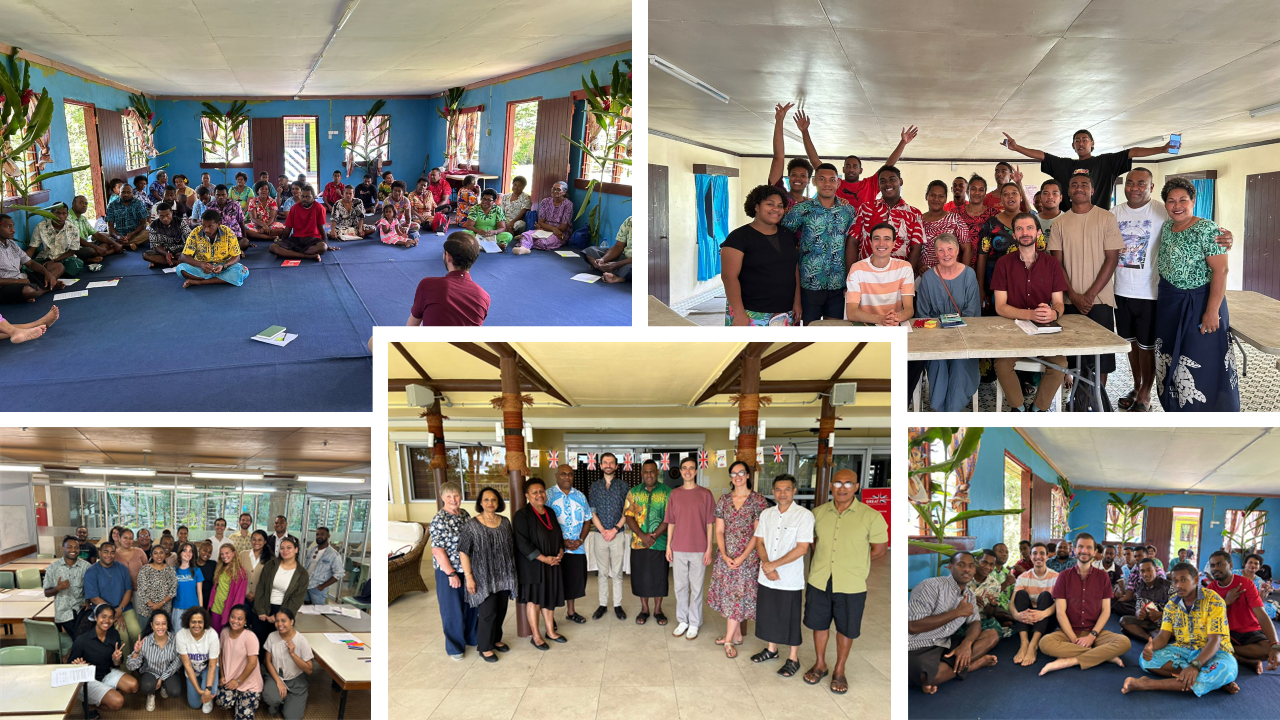
Outputs
Recognition
The success of the 2024 Ocean of Peace research was described by the British High Commissioner in official reports to London as an excellent example of Academic Action Diplomacy, highlighting the value academic research could bring to British Foreign Policy – here in particular the relationship between Britain and Fiji.
In May 2024 the Prime Minister of Fiji expressed his gratitude by not only hosting a dinner in London for the research team, but also by leading his team of senior government officials in song as an expression of his thanks. Dr Lesi, at the time the Permanent Secretary to the Fiji Ministry of Foreign Affairs, told us afterwards that this was an exceptional gesture.
In March 2025 work on the Ocean of Peace project was short-listed for the Newcastle University Engagement and Place awards.
In May 2025, Sue met with Dr Marcus Brand, Chair of the Fiji Truth and Reconciliation Commission and received positive feedback on the research paper referred to above, highlighting the complementarity between the anticipated work of the Commission and developments around the concept of the Ocean of Peace.
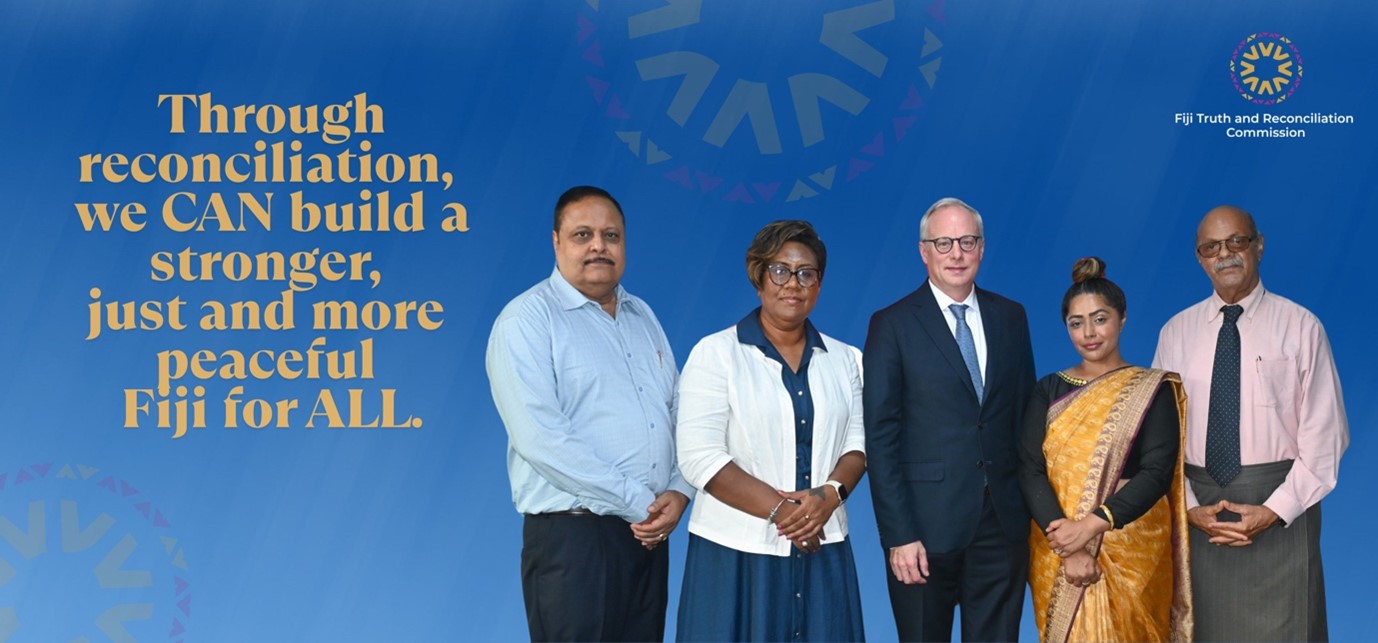
Impact
In July 2024 at the regional Pacific Islands Forum Leaders Meeting in Tonga, the Fiji Prime Minister tabled an OoP concept note and draft principles, gaining unanimous support to develop a formal declaration. Both these documents reflect the research findings of the 2024 Ocean of Peace Research project.
In September 2024, the statement of principles presented to MOFA by the research team was clearly reflected in Fiji’s first Foreign Policy White Paper.
Momentum has gathered pace, and a draft declaration is currently being worked on at the Pacific Islands Forum Secretariat which will be tabled at the leaders meeting being held in early September 2025 in the Solomon Islands. The UK team of academics is the only external group which has been engaged on the Ocean of Peace – a fact confirmed in May 2025 in conversation with Dr Lesi.
At the Pacific Islands Forum Leaders’ meeting in Honiara, leaders adopted the Declaration of the Pacific as An Ocean of Peace. The ambition of PM Rabuka is to now table this at the UN. The challenge now is to consider how the principles and spirit of the Declaration can be translated into action across the region and among its many different peoples.
